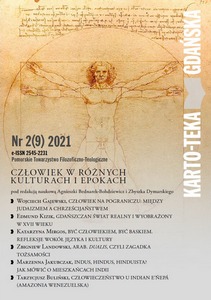Arab. Dualis, or the Mystery of Identity
Keywords:
Arab, arabic, arabicness, ethnos, identity, self-identification, cultural community, ethnic community, linguistic community, Arab genotypeAbstract
Arab. Dualis, or the mystery of identity, is a review article devoted to the critical presentation of scientific positions and perspectives of the last century, focusing on defining the concepts of ‘Arab’, ‘Arabic’ and ‘Arabic’. To this day, there are attempts to define them, more or less objective, in the literature on the subject. Scientists use the achievements of various fields and branches of science and their methods to obtain satisfactory result. Scientific achievements duplicate many misleading stereotypes and mythical axioms in this respect, often referring to the post-romantic vision of ‘Arab’ and later, post-war ideological positions commonly shaped by non-scientific factors. The scope of the study included selected Western literature on the subject; it represents the most important and influential research trends. They were divided into groups: referring to the common history, geographic and territorial identity, and linguistic identity as the basis of the unity of ‘Arabs’, emphasizing the etymological research of the title concept. The next sets of factors are the historical community, anthropological (including genetic), legal-political, and socio-psychological identity seen from the point of view of political science and cultural anthropology. Their boundaries are fluid, and the material illustrating them has been assigned to them arbitrarily – to avoid repetition.
Downloads
References
Ahmad F., The Young Turks and the Ottoman Nationalities: Armenians, Greeks, Albanians, Jews, and Arabs 1908–1918, University of Utah Press, Salt Lake City 2014.
Allen M., Arabs, Bloomsbury Publishing, London–New York 2006.
Arabowie. Słownik encyklopedyczny, red. M. M. Dziekan, PWN, Warszawa 2001.
Бибикова О. П., Арабы. Историко-этнографические очерки, АСТ, Москва 2008.
Bosworth C. E., The Arabs, Byzantium and Iran. Studies in Early Islamic History and Culture, Ashgate Publishing Company, Brookfield 1996.
Danecki J., Arabowie, PIW, Warszawa 2001.
Danecki J., Kultura islamu. Słownik, WSziP, Warszawa 1997.
Danecki J., Wstęp, w: B. Lewis, Arabowie w historii, PIW, Warszawa 1995.
Digard J.-P., Les Arabes: vus par Maxime Rodinson, “L’Homme” 1980, t. 20, nr 1, s. 113–116.
Dunlop D. M., Arab civilization to AD 1500, Longman, London–Beirut 1971.
Dziekan M. M., Arabowie przed islamem. Narodziny nowej religii, w: Bizancjum i Arabowie. Spotkanie cywilizacji VI–VIII wiek, red. T. Wolińska, P. Filipczak, PWN, Warszawa 2015, s. 47–63.
Faris N. A., Husajn M.T., The Crescent In Crisis. An Interpretative Study of the Modern Arab World, University of Kansas Press, Lawrence 1955.
Fryzeł T., Jedność arabska. Idea i rzeczywistość, WMON, Warszawa 1974.
Genetic Disorders in the Arab World: United Arab Emirates, Vol. 1, red. G.O. Tadmouri, A. M. Taleb,-al, N. Khaja,- al, United Arab Emirates University Press, Dubai 2004.
Gerges F. A., Making the Arab World: Nasser, Qutb, and the Clash That Shaped the Middle East, Princeton University Press, Princeton 2018.
Hathaway J., Arabowie pod panowaniem Osmanów, 1516–1800, współpr. K. K. Barbit, przeł. K. Pachniak, Dialog, Warszawa 2012.
Hayoun M., When We Were Arabs: A Jewish Family’s Forgotten History, The New Press, New York 2019.
Hittie P. K., Dzieje Arabów, PWN, Warszawa 1969.
Hourani A., Historia Arabów, Wydawnictwa Narody i Cywilizacje, Gdańsk 2003.
Hoyland R. G., Arabia and The Arabs. From the Bronze Age to the coming of Islam, Routledge, London–New York 2001.
Kayali H., Arabs and Young Turks: Ottomanism, Arabism, and Islamism in the Ottoman Empire 1908–1918, University of California Press, Berkeley–Los Angeles 1997.
Khalidi R., Anderson L., Muslih M., Simon R.S., The Origins of Arab Nationalism, Columbia University Press, New York 1993.
Khidayer E., Życie po arabsku, Prószyński i Ska, Warszawa 2013.
Lacoste Y., Le Grand Maghreb, un vaste ensemble géopolitique, w: L’Etat du Maghreb, red. C. de Lacoste-Dujardin, Y. Lacoste, La Découverte, Paris 1991.
Lewis B., Arabowie w historii, PIW, Warszawa 1995.
Madeyska D., Historia świata arabskiego. Okres osmański 1516–1920, WUW, Warszawa 1988.
Madeyska D., Historia świata arabskiego. Okres klasyczny od starożytności do końca epoki Umajjadów (750), WUW, Warszawa 1999.
Mackintosh-Smith T., Arabs. A 3,000-year history of peoples, tribes and empires, Yale University Press, New Haven–London 2019.
Mały słownik kultury świata arabskiego, red. J. Bielawski, WP, Warszawa 1971.
Rodinson M., Les Arabes, Presses universitaires de France, Paris 1979.
Schlicht A., Die Araber und Europa. 2000 Jahre gemeinsamer Geschichte, Kohlhammer, Stuttgart 2008.
Словарь русского языка, red. А. П. Евгеньевой, Рус. яз.; Полиграфресурсы, Москва 1999.
Wien P., Arab Nationalism: The Politics of History and Culture in the Modern Middle East, Routledge, London–New York 2017.
Źródła internetowe
Biblia Tysiąclecia, https://biblia.deon.pl [dostęp: 5 lutego 2021].
Bosworth C. E., ʿARAB i. Arabs and Iran in the pre-Islamic period, w: Encyclopaedia Iranica, t. II, cz. 2, s. 201–203, http://www.iranicaonline.org/articles/arab-i [dostęp: 5 lutego 2021].
Magee P., Review of “Arabia and the Arabs: from the Bronze Age to the coming of Islam” [New York 2003] by Robert G. Hoyland, w: “Bryn Mawr Classical Review” 2003, https://bmcr.brynmawr.edu/2003/2003.02.27 [dostęp: 5 lutego 2021].
New World Encyclopedia, https://www.newworldencyclopedia.org/entry/Arab#cite_note-13 [dostęp: 5 lutego 2021].
Овецкий М., https://proza.ru/avtor/makovetsky2 [dostęp: 31 sierpnia 2018].
Rodriguez-Flores J. L., Fakhro K., Agosto-Perez F., Ramstetter M. D., Arbiza L., Vincent T. L., Robay A., Malek J. A., Suhre K., Chouchane L., Badii R., Al-Nabet Al-Marri A., Abi Khalil Ch., Zirie M., Jayyousi A., Salit J., Keinan A., Clark A. G., Crystal R. G., Mezey J. G., Indigenous Arabs are descendants of the earliest split from ancient Eurasian populations, “Genome Res.” 2016, nr 26 (2), s. 151–162, https://www.ncbi.nlm.nih.gov/pmc/articles/PMC4728368 [dostęp: 5 lutego 2021].
Watt W. M., Cachia P., Who is an Arab?, https://www.africa.upenn.edu/K-12/Who_16629.html [dostęp: 5 lutego 2021].
Жуковская Д., Кто такие арабы?, w: История культуры, https://historicus.ru/kto_takie_arabi [dostęp: 5 lutego 2021].

 Academic Scientific Journals
Academic Scientific Journals

